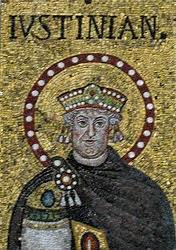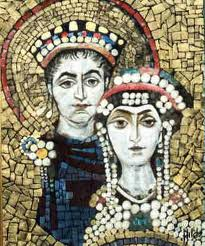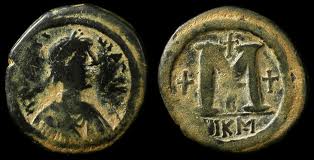|
Justinian was a Christian emperor of the Roman Empire on the cusp between Antiquity and the Middle Ages. Justinian is sometimes called "The Last of the Romans." He was born circa 482 in Pauresium, Illyricum. Justinian came to the throne with the intention of reestablishing the Roman Empire as it had been before the provinces of the Western Roman Empire fell under the control of various Germanic tribes during the fifth century.
The great emperor Justinian reigned from 527-565. During his time Roman influences weakened in the Byzantine Empire and Greek ones grew stronger. Justinian tried to keep Latin as the official language of the empire so he became known as the 'last of the Romans'.

Justinian's rise to imperial power began in 527 with his appointment as co-emperor to Justin I, his uncle, who died later that same year. His sole rule was characterized by profound efforts to strengthen the empire and return the state to its former ancient glory. To this end, Justinian drew upon administrators and counselors from outside the aristocratic class. His own modest origins, along with his selection of these court members, contributed to lasting tensions with the Byzantine nobility.

In foreign policy, Justinian sought to recover regions lost to foreign invaders, particularly Germanic tribes in Italy and North Africa. He thus launched one of the most aggressive military programs in medieval history. As a result of his reconquest of the empire's former western territories, he restored Ravenna's status as a capital in Italy.
Justinian is famous for drawing up a code of laws known as the Justinian code in 529-533, which influenced law in many European countries. He also tried to conquer those parts of the empire that had been lost to the Germanic peoples. he sent his great general Belisarius to North Africa in 533 and he succeeded in conquering the Vandal kingdom in what is now Tunisia and Algeria. In 536 Belisarius invaded Italy. He advanced quickly and took Rome. Justinian's army also took the southern part of Spain.

Justinian is also known for the extensive building program that he undertook both in the East and in Italy. The church of Hagia Sophia in Constantinople, which was completed in 562, is considered one of the finest examples of Byzantine.
Before becoming emperor, Justinian married Theodora, which upset a lot of people because she was an actress, and many people thought all actresses were bad women. But in fact she made a good empress, and Justinian seems to have loved her very much, even though they never were able to have any children.
Although committed to the idea of a Roman empire, Justinian recognized that his realms were basically Greek and that the imperial administration would be more effective, if the fact were recognized. Once the government stopped forcing the use of the Latin language and Roman institutions upon its people, the Eastern empire rapidly became more Eastern in its customs and outlook.
Justinian died on November 14, 565, in Constantinople. Justinian's conquests proved ephemeral, however. Within four years of his death, northern Italy had fallen to the Lombards, another Germanic tribe, and by the early eighth century, Muslim armies had conquered North Africa and Spain.
|

![]()


